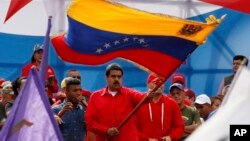One candidate is the son of Venezuelan President Nicolas Maduro, and another is his wife. A third is a socialist militant whom late socialist leader Hugo Chavez once called a criminal who should be jailed.
But of the 6,120 candidates in Sunday’s election for a 545-member legislative super body, none are from Venezuela’s opposition, which is boycotting what it calls a rigged ballot meant to consummate a dictatorship.
Critics say Maduro is less interested in rewriting the constitution, which already provides generous powers to the executive branch, than he is in obtaining the near-absolute powers that the new legislative body would have.
It would be able to dissolve state institutions, and its decisions could not be overruled by any other government agency.
Opposition boycotts, Socialists flood in
The absence of the opposition, which won a landslide victory in 2015 legislative elections, means the pool of aspirants for the all-powerful assembly is a mixture of well-known ruling Socialist Party leaders and rank-and-file pro-government activists.
Two-thirds of them will vie for seats distributed via municipalities and state capitals. The remainder are running for seats allocated to specific demographic groups, ranging from students to fisherman and farmers.
The son of Nicolas Maduro, who has the same name, is running as a candidate for public sector workers. In an interview with local media, he said he is qualified because he led a presidential inspection team created by his father to monitor public works, giving him valuable information to protect workers’ rights.
“We visited hospitals, public works, social programs, it was very advanced,” the younger Maduro, 27, told local television station Venevision this week.
On the ballot to represent Caracas, the capital, is first lady Cilia Flores, a Socialist Party power broker who has been widely accused of installing family members in positions of power.
Big name candidates
The election gives disproportionate weight to historically pro-government rural areas at the expense of opposition-leaning cities because seats are distributed by municipalities, which opposition leaders noted when refusing to join the vote.
They also say that the use of sectorial candidates gave too much leverage to the government-leaning electoral council to weed out candidates.
A significant portion of the seats will likely go to well-known party leaders such as Socialist Party No. 2 Diosdado Cabello, hard-line former Foreign Minister Delcy Rodriguez and oil workers union leader Wills Rangel.
But less-influential players are also seeking seats.
One is Valentin Santana, best known for leading a group known as “La Piedrita” or “The Little Stone” that describes itself as a revolutionary community organization that helps organize citizens in Caracas’ poor west end.
The late Chavez in 2009 excoriated Santana for making death threats against government adversaries, labeling him a criminal and calling on the chief prosecutor to arrest him.
Santana has three outstanding arrest warrants and has evaded multiple attempts by authorities to detain him, according to local media. Reuters was unable to contact him.
World criticizes election
The election has been highly criticized by governments around the world. Opposition leaders say the Socialist Party will use it arbitrarily to arrest adversaries and to sack public officials who question the government, such as dissident chief prosecutor Luisa Ortega.
Since April, Maduro’s opponents have been staging violent street demonstrations to protest his refusal to respect the opposition-led Congress and to demand a resolution to a severe economic crisis.
More than 100 people have been killed in the unrest.
Some candidates say the opposition’s withdrawal has opened possibilities for socialist activists without links to political parties to take part in the vote.
Orlando Toral, 33, is running as a candidate under the demographic of people with disabilities, citing a slight limp resulting from an infection he got after a skateboarding accident.
“I’m happy that people with disabilities also have rights, thanks to laws created in the revolution,” Toral said as he prepared to join a rally with Maduro marking the close of the campaign. “(The opposition) is seeking to delegitimize a process that is going to bring power to all of us.”





